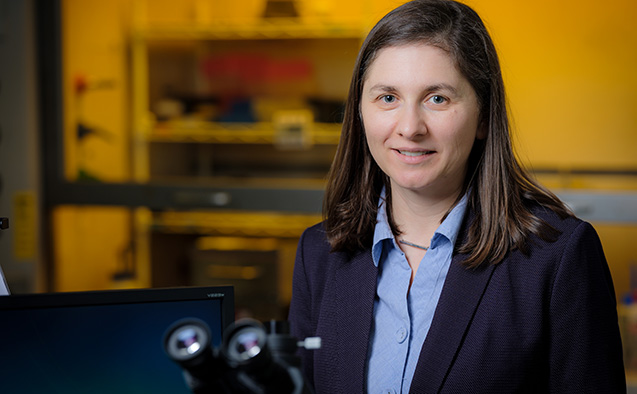Physics professor brings first NSF Special Creativity award to WFU
Group research aims to shorten the path from concept to commercialization for organic semiconductors

A team of researchers at Wake Forest University, the University of Kentucky and Princeton University have received a rare and coveted National Science Foundation Special Creativity extension for their current grant. This award allows the group to take on high-risk, high-reward opportunities in electronic materials. Physics professor Oana Jurchescu leads the Wake Forest effort.
Only a very small number of NSF grants are awarded a Special Creativity extension. Jurchescu is the first WFU faculty member to receive this award. Special Creativity extension recipients are expected to transform their field.
The award provides 18-months of continued funding for a collaborative research project called OSCAR (Organic Semiconductors by Computation on the Accelerated Refinement) through the National Science Foundation’s Designing Materials to Revolutionize and Engineer Our Future program. The mission of OSCAR is to develop methods for design of organic semiconductors that will shorten the path from concept to commercialization for optoelectronic materials and devices.
The award recognizes the NSF’s most creative investigators who are attacking research problems at the forefront of their fields. They are selected based on their past performance and the research problems that they address.
During OSCAR’s first five years, the team published more than 50 manuscripts and developed a new class of high-mobility organic semiconductors. They now have the opportunity to work on cutting-edge methods to get flexible electronics technology on the market more quickly.
“We are excited to continue to work together. When researchers with specialized expertise work together, progress is faster than when everyone works independently. ” Professor of Physics Oana Jurchescu
The development of electronic materials for emerging applications that can simultaneously meet the performance and cost metrics is currently dominated by trial-and-error approaches, Jurchescu explained. “This is not only very time-consuming but also very wasteful. Our team is combining computational studies with synthesis, processing and characterization to shorten this path. With support from this extension, we hope to break into real applications like X-ray detectors. We will develop lightweight, flexible sensors that could greatly improve the quality of healthcare through better, lower-cost dose monitoring during radiation diagnostics and therapy.”
This is not the first distinction for Jurchescu, who was named Wake Forest’s Baker Family Professor of Physics in 2021. She has been elected a member of the Executive Committee of Division of Materials Physics within the American Physical Society and is a fellow of the Royal Society of Chemistry.
Categories: Research & Discovery
Wake Forest News
336.758.5237
media@wfu.edu
Meet the News Team
Headlines
Wake Forest in the News
Wake Forest regularly appears in media outlets around the world.




